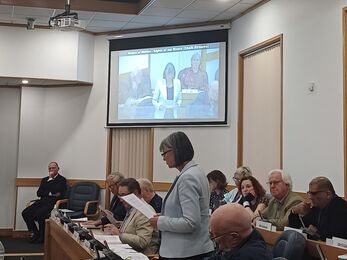This landmark move marks an unprecedented step in granting legal rights to rivers, offering greater protection to Hampshire’s globally rare chalk streams and delivering a major victory for nature.
The Rights of the River movement acknowledges the fundamental rights of nature and our duty to protect it. It is informed by the Universal Declaration of the Rights of Rivers, which outlines rights such as the right to flow and to remain free from pollution.
Ahead of the vote, the Trust hosted a Rights of the River Forum to hear from local residents about how best to protect and restore Basingstoke’s chalk streams. Insights from these powerful and heartfelt conversations were woven into the final motion, helping to deliver a truly localised Rights of the River motion that reflects the voices and values of the local community.
“This is a turning point” said Debbie Tann MBE, Chief Executive of Hampshire and Isle of Wight Wildlife Trust. “Hampshire is home to so many of England’s iconic chalk streams, but those in the north - like the River Loddon - are often overlooked and have no formal legal protection. Years of underinvestment, over-abstraction, pollution from untreated sewage, and toxic road runoff have pushed these habitats to the brink.
“This Rights of our rivers (Chalk Streams) motion is an important first step in turning this around. It sends a clear message: nature matters, and healthy rivers must be a priority in local planning, investment, and governance. What happens in Basingstoke speaks to a bigger story across our county.
“Recognising rivers as having legal rights shows real leadership and reflects growing public demand for change.”
Lewes District Council was the first local council in England to recognise river rights (Rights of the River Ouse), setting a precedent now followed in Hampshire. This movement draws on international models in New Zealand, Canada, and Colombia, where rivers are recognised as legal entities with rights informed by the Universal Declaration of the Rights of Rivers. These include the right to flow, to perform essential ecological functions, to remain free from pollution, to interact with sustainable aquifers, to support native biodiversity, and to regenerate.




